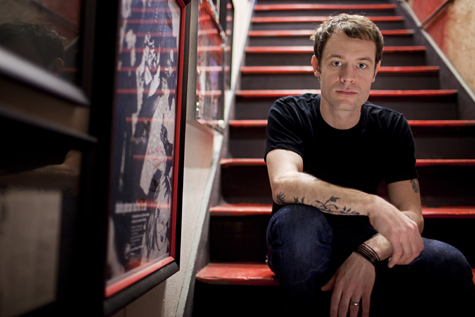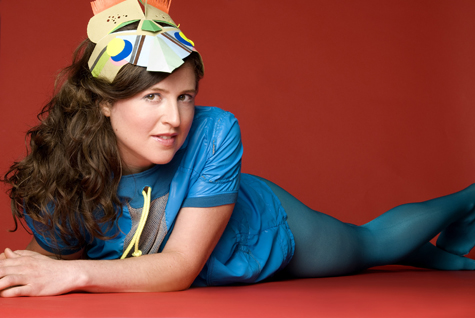Rocky Votolato prepares for another tour and looks toward writing a new album
It may not be “brain surgery,” but writing is certainly difficult work. Ask any working writer staring at a blank page for countless hours, and they’ll most likely tell you the same. In fact, it may certainly feel like brain surgery, because sometimes forming those words into sentences requires exhausting effort. Singer/songwriter Rocky Votolato has become rather familiar with the ardors of writing over the past decade. First working in bands such as Waxwing and now with his solo career, Votolato has shed blood on the page, crafting bullshit-free lyrics rife with personal meaning.
But Votolato doesn’t come off as overly emotional when you speak with him on the phone, nor does he seem to take himself too seriously. He’s pleasant, a regular working family man–married with two children, one of whom is about to graduate high school and head on to college, which he admitted was a little nerve-racking.
“She’s considering going to an art school–a college for art,” said the Seattle-based musician. “We’ve been looking into scholarships for that, so hopefully it will work out for her.”
Filling out financial aid paperwork is just another thing to add to Votolato’s full plate. In February 2010, he released his most recent full-length album, True Devotion, his first in almost three years. The time between 2007’s The Brag and Cuss and his most recent effort saw Votolato’s lifelong battle with anxiety and depression intensify. However, he was able to work through it. With a renewed sense of vigor, he released his latest album and has spent much of his time since on the road promoting it, playing hundreds of shows. With the distractions and tumult of life on the road, and a busy family life at home, it’s remarkable he’s able to find time to work on his craft at all–considering he, like many writers, prefers solitude while working.
“Writing is a solitary thing,” Votolato said. “If you can’t be alone, then you should never be a writer, because that’s what it’s all about. You have to be comfortable with yourself and your own mind.”
Though he does some writing while touring, Votolato said he prefers to do the bulk of his work at home where there are “creative resources” and he feels he can “fully devote time and attention to the craft of songwriting.” In order to achieve the level of solitude he requires to do his job, Votolato said that he relies on a strong sense of discipline, which is aided by the fact that he has a family.
“You have to be dedicated and disciplined,” he explained. “I get up at 8 every day, and I think the family gives you more structure than most musicians. But anyone who produces work regularly and does good work is usually working all the time and spending a lot of time doing it.”
In a recent conversation with Submerge, Votolato talked about preparing for his upcoming tour, which kicks off Feb. 18, 2011 in Portland. He also waxed eloquent about his writing process, of which he said he was “changing as an artist and figuring out more of what I want from the process of writing and what it takes to get something good out of it.” As it turned out, the plans for his upcoming tour were also in a state of flux.
You’re heading out on the road soon. What are you doing to prepare for this tour? Are you going out with a full band or will you be going out by yourself?
Well, right now that’s still undetermined, which is strange because it’s just a few weeks away, really. But I’m rehearsing and trying out people right now for a band I’m putting together. I haven’t found the right people. I’ve found the right guitar player, who is also going to sing backups, but he’s not available for this tour. He’s going to fly out to Chicago and meet me there, but he won’t be there for the Sacramento show. I’m looking for a drummer. So I could potentially have a drummer for the whole tour if I find the right guy, but I’m probably going to either do the shows for most of the tour as a duo with me and a drummer, or solo if I can’t find the right guy. Then the last eight shows of the tour, I’m going to have my guitar player come out and we’ll finish out the leg.
Is this normally how it comes together, or do you have it more prepared in advance?
I usually have it more prepared, but the thing is, I’ve been touring a lot, so it’s been difficult to figure out rehearsal times. It’s just been my schedule. I did close to 200 shows last year, so I was on tour all year, and I was just playing solo–not really with a band, and I’ve been doing it that way for the last couple of years. It’s kind of a new endeavor to try to find the right guys. Obviously, I’ve played with people in the past off and on, but this time, I’m looking for a more solid band to have go-to guys for hiring for shows and festivals. My vision is I’d like to have a band at some point–or at least have the option if I’d like to do a tour. I would like to do this tour with a band, but I just haven’t found the right guys yet.
You mention that you’re looking for the right guys; is there specific criteria you’re looking for?
It’s kind of like dating. When you meet the right person, you just know it. Music is like, once you start playing with someone, then you know how it feels on the musical side, but then there’s also the personality side, which you just have to be a really good fit. I’m just being really picky. I can go do shows by myself, and that’s fine with me. I’d rather have the right guys instead of dudes who are just filling in. I don’t want to play with just anybody.
You say you want to get together a regular band. Are you looking for guys you can go into the studio with for another record?
Yeah, that’s been the real struggle right now. Last week I tried out three different drummers and this week I’m going to practice with a bunch of dudes from Seattle. I’ve got a band potentially put together for the album, but some of the guys aren’t touring guys. They’re just really pro players here in Seattle, but they’re a little older and have families. It’s a hard mix to figure out exactly who is going to play on the album, but I’m already thinking forward about making another record, so I really want to get that worked out before I go back on tour.
Do you have more songs ready for a new album?
I’ve probably got half a record’s worth of stuff now, but we’ll see where it ends up. I like to keep it tentative at this point, because it’s so hard to know when it’ll be ready, but I’m definitely working toward it. I’m working on the songs now, and I still have another month to go before the tour, which I’m spending writing.
Before you said what you were looking for in the process of writing was changing. At this point, what do you think that is?
There’s this metaphor that this writing teacher talks about, and it’s basically like baking a cake is a good way to think of it. If you put ingredients in, the ingredients are the details of your life, like the eggs and the flour and whatever else you’re putting in there, and the heat is how you feel about those things in your life, and when you put those things together and put them in the oven then it makes the cake. That metaphor is a good way to describe how I’m trying to think about my writing process. The details of my life go into the soup and then it comes out on the other side where it’s not vague… I really see [my songs] as poems, and I want them to be good poems on their own first. At that point, I’m sure when I’m singing them that the lyrics will be good. That’s one thing that’s changed in the process. I’m really serious about wanting the writing itself to be good or better than anything I’ve done before.
For you it’s a twofold process. You write the words and the music. Does one drive you crazy more than the other?
They both equally drive me totally insane [laughs]. The writing does the writing. It does itself when it works. You just have to keep trying. Some days, I can write a piece of music and it just comes out, and, “Oh that took 10 minutes. That’s awesome.” The next day I’m playing guitar for four hours, and I still don’t have anything I like. It’s the same with the lyrics, or writing poems. I think the thing is to keep trying and keep the flow going and try to keep the internal critic from speaking up too much. [The voice that] says, “Oh, what is so and so going to say about that? Oh that sucks,” because I think we all have that going on too. I think that everyone who is trying to be a working artist is dealing with that. So it’s all about getting creative and finding ways to break through that. It’s a struggle, man. I’d be lying to you if I told you it’s easy for me. Just because I’ve been doing it for a living and have been doing it for 10 years, I don’t think it ever becomes easy. It’s a serious political act to be honest. So few people are.
Do you ever get squeamish about the details you reveal about your own life in songs?
No, only if I haven’t done a good enough job, I feel, as a writer. You can present anything in a way that’s creative and artistic if you do it with enough skill and craft and the right inspiration. Obviously, I feel like I’ve had some successes and some failures artistically, but they’re all successes in a certain sense because it’s a learning process… We’ll see where it ends up. I’m enjoying it. I’d rather be doing this than anything else. I know that.
See Rocky Votolato when he plays Harlow’s along with Laura Gibson on Feb. 21. Showtime is 7:30 p.m. and tickets cost $12.


